2023年外研版中考英语一轮复习 第四节 七年级下册 Module 7 ~ Module 12课件(共107张PPT)
文档属性
| 名称 | 2023年外研版中考英语一轮复习 第四节 七年级下册 Module 7 ~ Module 12课件(共107张PPT) | 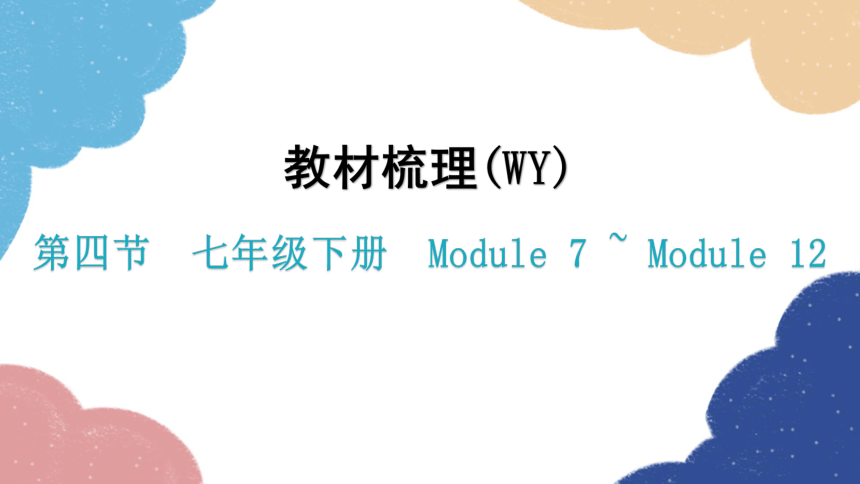 | |
| 格式 | pptx | ||
| 文件大小 | 730.9KB | ||
| 资源类型 | 教案 | ||
| 版本资源 | 外研版 | ||
| 科目 | 英语 | ||
| 更新时间 | 2023-06-03 22:24:41 | ||
图片预览

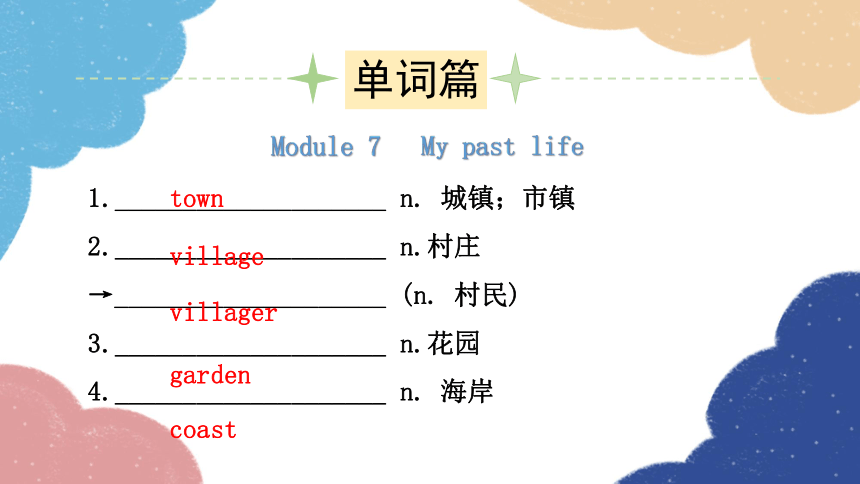
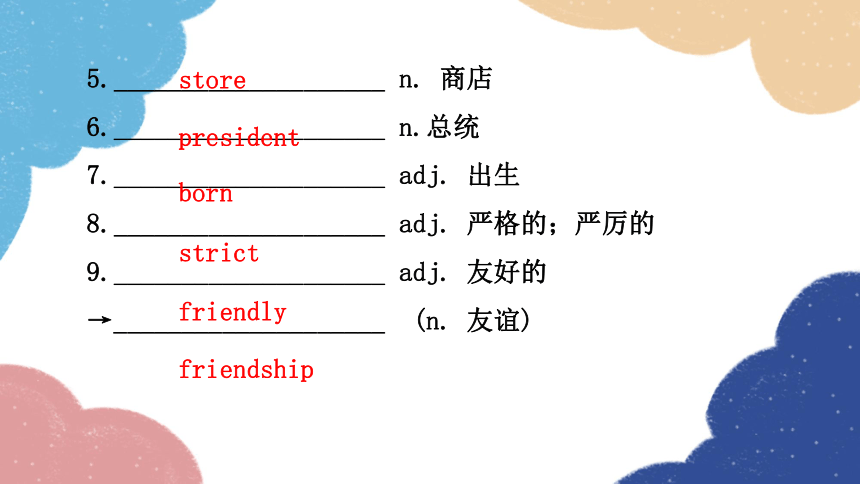
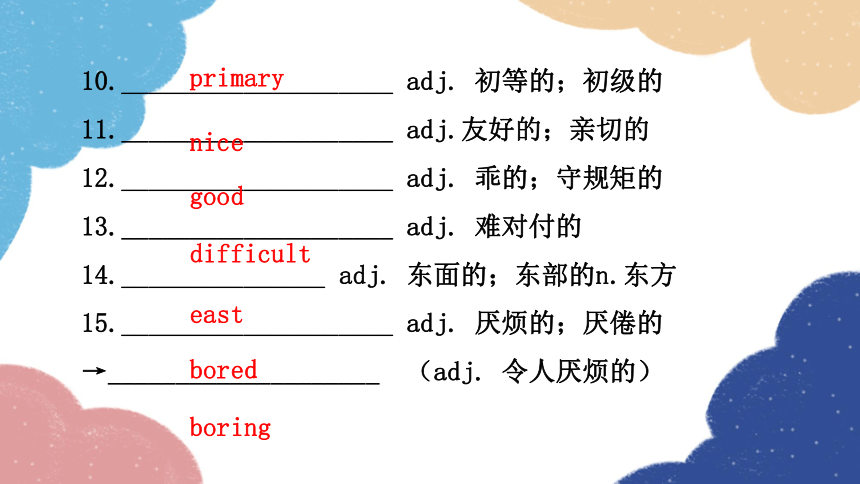
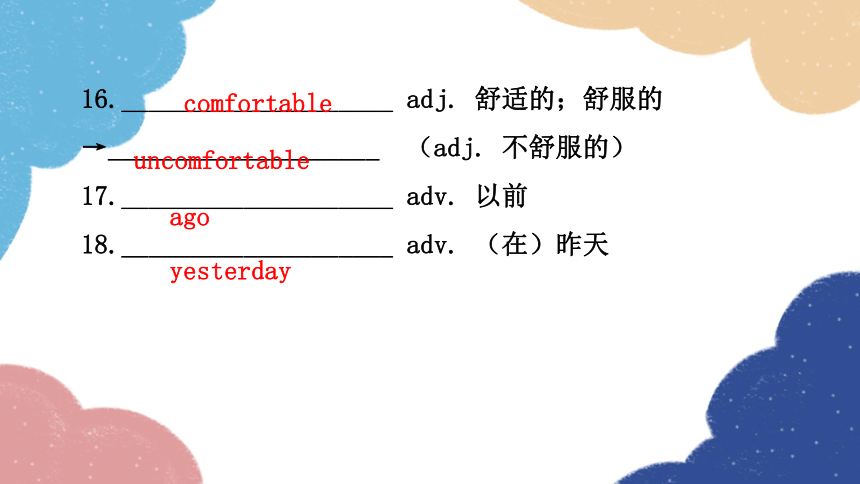
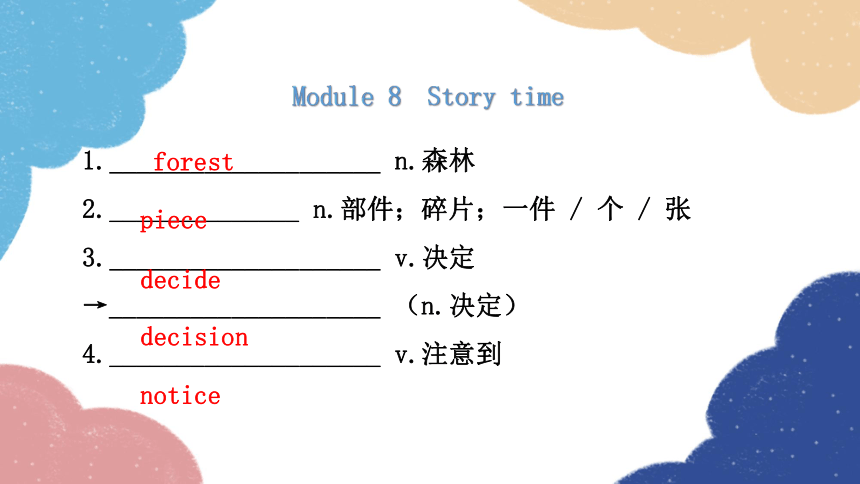
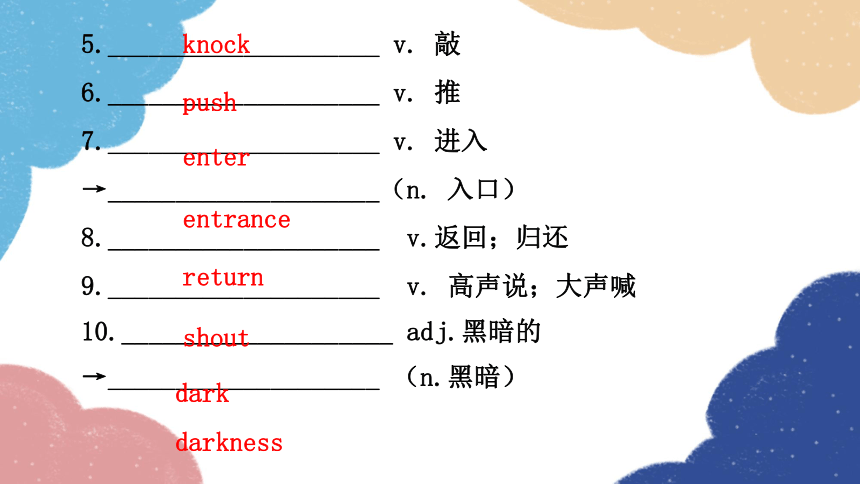

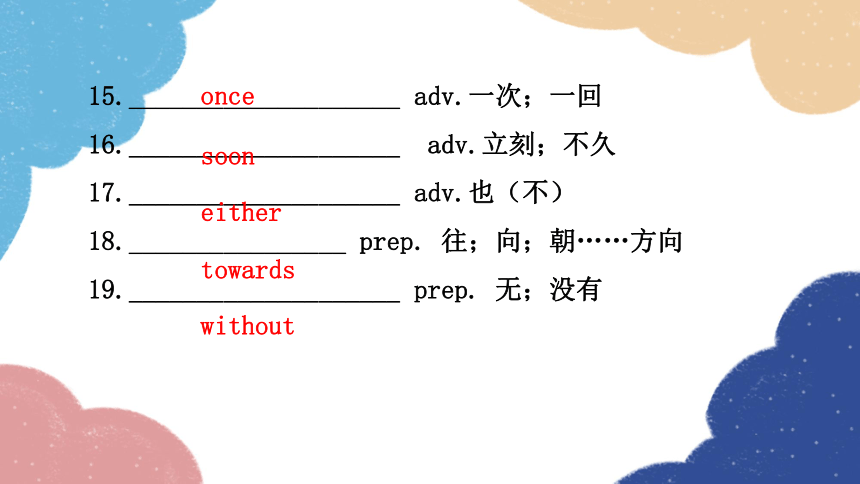
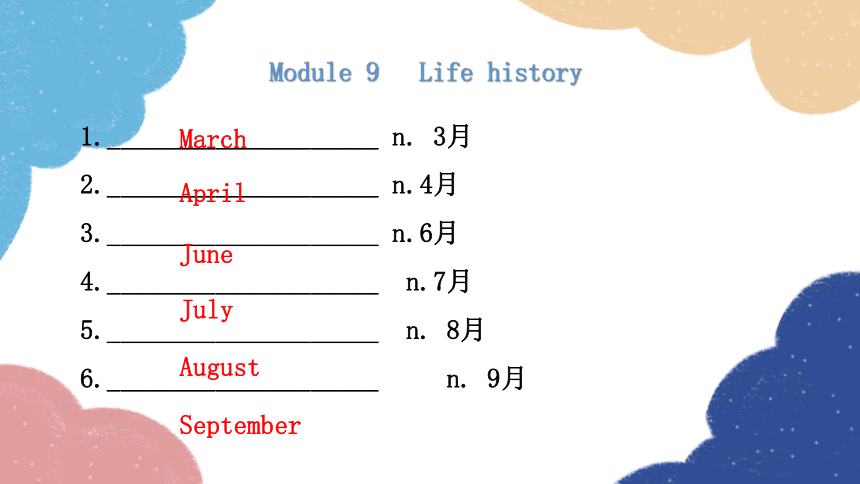
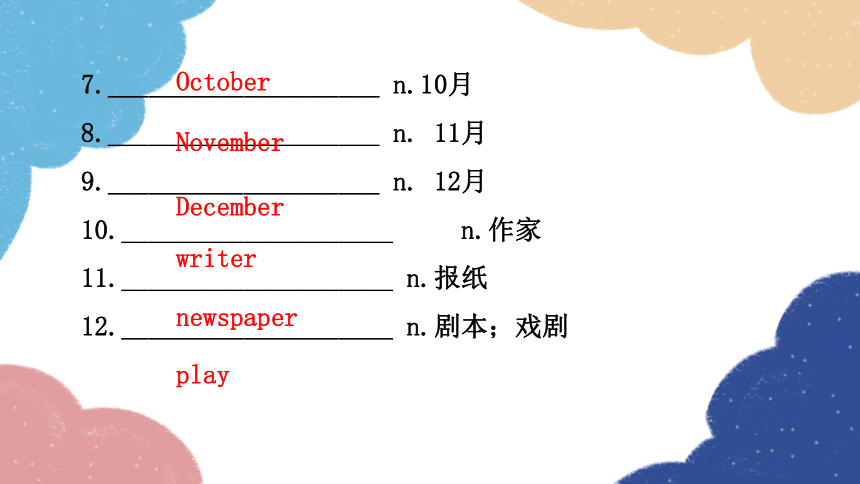
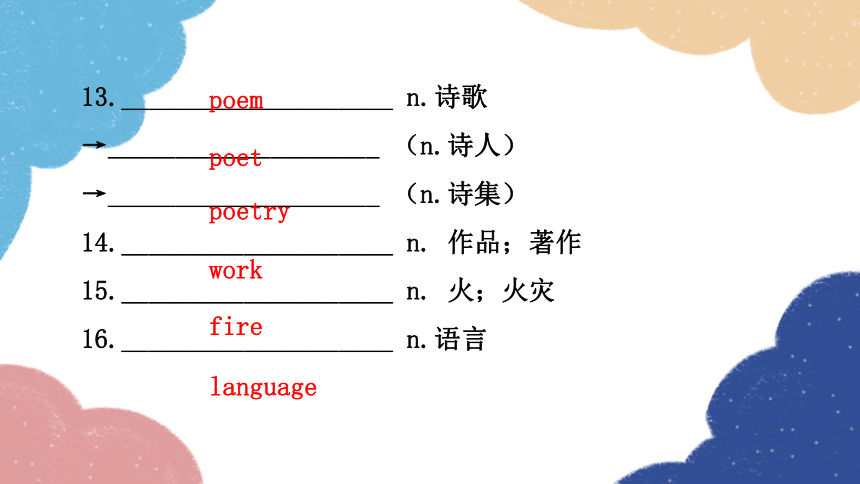
文档简介
(共107张PPT)
教材梳理(WY)
第四节 七年级下册 Module 7 ~ Module 12
Module 7 My past life
单词篇
1.____________________ n. 城镇;市镇
2.____________________ n.村庄
→____________________ (n. 村民)
3.____________________ n.花园
4.____________________ n. 海岸
town
village
villager
garden
coast
5.____________________ n. 商店
6.____________________ n.总统
7.____________________ adj. 出生
8.____________________ adj. 严格的;严厉的
9.____________________ adj. 友好的
→____________________ (n. 友谊)
store
president
born
strict
friendly
friendship
10.____________________ adj. 初等的;初级的
11.____________________ adj.友好的;亲切的
12.____________________ adj. 乖的;守规矩的
13.____________________ adj. 难对付的
14._______________ adj. 东面的;东部的n.东方
15.____________________ adj. 厌烦的;厌倦的
→____________________ (adj. 令人厌烦的)
primary
nice
good
difficult
east
bored
boring
16.____________________ adj. 舒适的;舒服的
→____________________ (adj. 不舒服的)
17.____________________ adv. 以前
18.____________________ adv. (在)昨天
comfortable
uncomfortable
ago
yesterday
Module 8 Story time
1.____________________ n.森林
2.______________ n.部件;碎片;一件 / 个 / 张
3.____________________ v.决定
→____________________ (n.决定)
4.____________________ v.注意到
forest
piece
decide
decision
notice
5.____________________ v. 敲
6.____________________ v. 推
7.____________________ v. 进入
→____________________(n. 入口)
8.____________________ v.返回;归还
9.____________________ v. 高声说;大声喊
10.____________________ adj.黑暗的
→____________________ (n.黑暗)
knock
push
enter
entrance
return
shout
dark
darkness
11.____________________ adj.迷路的
12.____________________ adj.小的
13.____________________ adj. 感到饿的;饥饿的
→____________________ (n.饥饿)
14.____________________ adj.睡着的
→____________________ (v.睡觉)
→____________________ (adj.困倦的)
lost
little
hungry
hunger
asleep
sleep
sleepy
15.____________________ adv.一次;一回
16.____________________ adv.立刻;不久
17.____________________ adv.也(不)
18.________________ prep. 往;向;朝……方向
19.____________________ prep. 无;没有
once
soon
either
towards
without
Module 9 Life history
1.____________________ n. 3月
2.____________________ n.4月
3.____________________ n.6月
4.____________________ n.7月
5.____________________ n. 8月
6.____________________ n. 9月
March
April
June
July
August
September
7.____________________ n.10月
8.____________________ n. 11月
9.____________________ n. 12月
10.____________________ n.作家
11.____________________ n.报纸
12.____________________ n.剧本;戏剧
October
November
December
writer
newspaper
play
13.____________________ n.诗歌
→____________________ (n.诗人)
→____________________ (n.诗集)
14.____________________ n. 作品;著作
15.____________________ n. 火;火灾
16.____________________ n.语言
poem
poet
poetry
work
fire
language
17.____________________ v.成为
→____________________(过去式)
→____________________(过去分词)
18.____________________ v. 结婚
19.____________________ v. 建造
→____________________ (过去式 / 过去分词)
become
became
become
marry
build
built
20.____________________ v.死;去世
21.____________________ adj.富有的
22.____________________ adj.准确的;确切的
→____________________ (adv.确切地)
23.____________________ adj.成功的
→____________________ (n.成功)
→____________________ (v.成功)
→____________________ (adv.成功地)
die
rich
exact
exactly
successful
success
succeed
successfully
Module 10 A holiday journey
1.____________________ n. 顶端
2.____________________ n. 电灯
3.____________________ v. 猜;猜测
4.____________________ v. 到达
5.____________________ v. 放松
→__________________ (adj.放松的;自在的)
→____________________ (adj.令人放松的)
top
light
guess
arrive
relax
relaxed
relaxing
6.____________________ v. 卖;出售
→____________________(过去式 / 过去分词)
7.____________________ adj. 激动的;兴奋的
→____________________ (adj.令人激动的)
→____________________ (n.激动)
8.____________________ adj. 举世闻名的
9.____________________ adj. 绝妙的;了不起的
sell
sold
excited
exciting
excitement
world-famous
wonderful
10.____________________ adv. 那么;这么
11.____________________ adv. 在使用中;开着的
12.____________________ conj.直到……为止
→____________________ (同义词)
so
on
till
until
Module 11 Body language
1.____________________ n.德国人adj.德国的
→____________________ (复数)
2.____________________ n. 日本人adj.日本的
3.________________ n. 俄罗斯人adj. 俄罗斯的
4.____________________ n. 游客;观光者
5.____________________ n.俄罗斯
German
Germans
Japanese
Russian
visitor
Russia
6.____________________ n. 印度
7.____________________ n. 不列颠;英国
8.____________________ n. 事实;细节
9.____________________ v. 鞠躬;弯腰
10.____________________ v.& n.吻;亲吻
11.____________________ v.摇晃
→____________________(过去式)
→____________________(过去分词)
India
Britain
fact
bow
kiss
shake
shook
shaken
12.____________________ v.&n.微笑
13.____________________ v.点(头)
14.____________________ v. 拥抱;紧抱
15.____________________ v.触摸;接触
16.____________________ v.握着;使不动
→____________________(过去式 / 过去分词)
smile
nod
hug
touch
hold
held
17.____________________ v. 移动
18.____________________ v.挥(手);招(手)
19.____________________ v.带来
→____________________(过去式 / 过去分词)
20.____________________ adj.英国的;英国人的
21.____________________ adj.外国的
→____________________ (n.外国人)
move
wave
bring
brought
British
foreign
foreigner
22.____________________ adj.个人的
→____________________ (n.个人)
23.____________________ adj.礼貌的
→____________________ (adj.不礼貌的)
24.____________________ adj.粗鲁的;无礼的
25.____________________ adv.一起;共同
26.____________________ adv. 某处;某个地方
personal
person
polite
impolite
rude
together
somewhere
Module 12 Western music
1.____________________ n. 声音
2.____________________ n. 小提琴
3.____________________ n. 歌剧
4.____________________ n. 声音
5.____________________ n. 乐手;音乐家
→____________________(n. 音乐)
→____________________(adj. 音乐的)
sound
violin
opera
voice
musician
music
musical
6.____________________ n. 中心
→____________________(adj. 中心的)
7.____________________ n. 世纪
8._______________ n. (写作、音乐或艺术的)作品
9.____________________ v. 相信
10.__________________ adj. 活泼的;轻快的
11.____________________ adj. 现代的
centre
central
century
piece
believe
lively
modern
12.____________________ adj. 吵闹的
→____________________(n.噪声)
13._________________ adj. 流行的;受欢迎的
14.____________________ adj. 西方的
15.____________________ adj. 欧洲的
→____________________(n. 欧洲)
16.____________________ adj. 经典的;古典的
noisy
noise
pop
Western
European
Europe
classical
17.____________________ adj. 年长的
18.____________________ adj. 贫穷的
19.____________________ adj. 完美的
20._________________ prep. 由……创作;被;由
21.____________________ prep. 穿过
22.____________________ pron. 两个;两者
23.____________________ pron. 又一个;再一个
elder
poor
perfect
by
through
both
another
短语篇
1. 小学 ____________________
2. 电影院 ____________________
3. 在……的东海岸 ____________________
4. 破碎 ____________________
5. 从前 ____________________
primary school
movie theater
on the east coast of
in pieces
once upon a time
6. 散步 ___________________
7. 独自一人的 ____________________
8. 拿起;举起 ____________________
9. 起初;首先 ____________________
10. 指着…… ____________________
11. 与……不同 ____________________
12. 妇女节 ____________________
go for a walk
all alone
pick up
at first
point at
be different from
Women' s Day
13. 国庆节 ____________________
14. 儿童节 ____________________
15. 世界各地 ____________________
16. 在……岁时 ____________________
17. 在19世纪60年代 ____________________
18. 发现;查明;弄清 ____________________
National Day
Children' s Day
around the world
at the age of
in the 1860s
find out
19. 很值得做某事 ____________________
20. 开车送某人去…… ____________________
21. 前天 _______________________
22. 排队 ____________________
23. 艺术品 ____________________
24. 在度假 ____________________
be well worth doing sth.
drive sb. to …
the day before yesterday
wait in line
works of art
on holiday
25. 乘船游览 ____________________
26. 握手 ____________________
27. 事实上 ____________________
28. 臂挽臂地 ____________________
29. 一点也不 ____________________
30. 互相;彼此 ____________________
take a boat tour
shake hands
in fact
arm in arm
not at all
each other
31. 个人空间 ____________________
32. 舞曲 ____________________
33. 离开;搬走 ____________________
34. 在……的中心 ____________________
personal space
dance music
move away
in the centre of …
课文篇
句式复习
1. 我出生在山西省的一个小村庄。
______________________________________________
2. 在那里玩耍很开心。
______________________________________________
I was born in a small village in Shanxi Province.
It was great to play there.
3. 她不喜欢那张中等大小的床,也不喜欢那张大床。
____________________________________________
4. 它也不舒服。
____________________________________________
5. 像400年前的许多人一样,莎士比亚的父母不识字。
____________________________________________
____________________________________________
She didn' t like the middle bed or the big bed.
It was not comfortable either.
Like many people 400 years ago, Shakespeare' s parents didn' t learn to read or write.
6. 在学校时他喜欢戏剧,所以在14岁毕业的时候他决定当一名演员。
______________________________________________________________________________________
7. 去那里花了多长时间?
___________________________________________
8. 我们一直等到所有的灯都亮起来。
___________________________________________
At school he liked plays, so he decided to be an actor when he finished school at fourteen.
How long did it take to get there?
We waited till all the lights were on.
9. 不要和北美人站得太近!
___________________________________________10. 那是因为不同国家的人们做法不同。
___________________________________________
___________________________________________
11.好漂亮的城市!
___________________________________________
Don' t stand too close to North Americans!
That' s because people do different things in different countries.
What a beautiful city!
12.还不到6岁,他就既会弹钢琴,又会拉小提琴。
___________________________________________
___________________________________________
Before he was six, he played not only the piano but also the violin.
语篇再现
Passage 1
【七年级下册 Module 7】
Our house was big and comfortable. There was a big 1.__________ room with a TV, a kitchen, a bathroom and three bedrooms. On my bedroom walls there 2.__________ pictures of my favourite movie stars.
living
were
Behind the house, there 3.__________ a big garden with lots of trees and there was a small lake 4.__________ fish in it. 5.__________ was great to play there.
was
with
It
Passage 2
【七年级下册 Module 9】
Shakespeare was born in 1564 in Stratford, England. Like many people 400 years ago, Shakespeare' s parents 1.__________ learn to read or write. At school he liked plays, so he 2.__________ to be an actor when he finished school at fourteen. He 3.__________ in 1582 and had three children.
didn' t
decided
married
Shakespeare 4.__________ to London and joined a theatre company in about 1592. He became a successful actor and began to write 5.__________. Queen Elizabeth I enjoyed his works very much.
went
plays
考点篇
1.There _____________ (not) any milk in the fridge yesterday.
2.It ___________ cold yesterday, but most children ________________ still outside.
考点1
一般过去时(1)【七年级下册 Module 7】
专练
用be动词的适当形式填空
wasn' t
was
were
3.—Where __________ your father now
—I don' t know. But he _________ here just now.
is
was
点拨
be动词的过去式为was / were。当主语是第一人称单数或第三人称单数时,be动词用was,否定形式为wasn' t;当主语是第二人称或其他人称复数时,be动词用were,否定形式为weren' t。( 详解见主书第一部分[第十节谓语动词的时态])
考点2
bored和boring的区别【七年级下册 Module 7】
1. How ______________ the movie is! Most of us almost fall asleep.
2. Children wriggle(扭动)themselves when they are ______________.
专练
根据句意,用bored或boring填空
boring
bored
点拨
以“-ed”结尾的形容词用来表达人的内在感受;而以“-ing”结尾的形容词描述事物带来的感受。常见的这类词有:tired→tiring, excited→exciting, relaxed→relaxing, interested→interesting等。
考点3
一般过去时(2)【七年级下册 Module 8】
I went on a trip to Beijing during the holidays last year. I ____1____ there for three days. After I ____2____ in Beijing, I went to the hotel by taxi.Then I went to Beihai Park. I saw lots of beautiful flowers in it.
专练
stayed
arrived
After that I ____3____ Beijing Zoo.There were many animals in the zoo and I liked the pandas very much. I think they are very cute.The next day, I went to the Great Wall. I ____4____ all day. I was tired but happy.
visited
walked
( )1.A.stay B.stayed C.am staying
( )2.A.arrive B.arrived C.will arrive
( )3.A.visit B.visited C.am visiting
( )4.A.were walking B.walk C.walked
B
B
B
C
点拨
动词过去式的构成规则:(1)一般情况下在词尾直接加-ed;(2)以不发音的字母“e”结尾的动词,直接加-d;(3)以“辅音字母+y”结尾的动词,改“y”为“i”,再加-ed;(4)以“元音字母+一个辅音字母”结尾的重读闭音节动词,双写辅音字母,再加-ed。(详解见主书第一部分[第十节 谓语动词的时态])
考点4
asleep, sleepy和sleep的区别【七年级下册Module 8】
( )1. After supper, I want to go to ______________.
A. sleepy B. asleep C. sleep
( )2. He was ____________________, so he fell fast ____________________.
A. sleepy; asleep B. asleep; sleep C. asleep; sleepy
专练
C
A
点拨
比较项 含义及用法
asleep 意为“睡着的”,常作表语,强调状态,不能单独放在名词前作定语。常见搭配为:be asleep 睡着(表示状态),fall asleep 入睡(表示动作)
sleepy 意为“困倦的;昏昏欲睡的”,作形容词,常与feel或be动词搭配
sleep 意为“睡觉”,作动词或名词
考点5
一般过去时(3)【七年级下册Module 9】
Last Sunday,it ____1____ sunny.My father ____2____ my sister Emily and me to Hong Kong Museum of History.The museum is in Kowloon Park.We also ____3____ to the swimming pool in the park. Emily and I ____4____ for two hours in the pool. We felt relaxed and happy on that day.
专练
was
took
went
swam
( )1.A.is B.was C.were
( )2.A.taked B.takes C.took
( )3.A.go B.going C.went
( )4.A.swimmed B.swam C.swims
B
C
C
B
点拨
规则动词变过去式,通常是直接在动词原形后加-ed或者-d。但有些动词并不遵循这一规则,我们称之为不规则动词,需特别加以记忆。(详解见主书第一部分[第十节 谓语动词的时态])
( )1.—____________________
—We went there by car.
A.How do you get there
B.How did you get there
C.How did you got there
考点6
一般过去时(4)【七年级下册 Module 10】
专练
B
( )2.—Where _______ your sister ___________ last holiday
—She went to Yunnan.
A. did; go B. does; go C. will; go
( )3.—____________ did you have a party
—Last night.
A. What B. Who C. When
A
C
一般过去时的特殊疑问句的构成:(1)特殊疑问词+was / were+主语+其他?(2)特殊疑问词+did+主语+动词原形+其他?(详解见主书第一部分[第十节 谓语动词的时态])
点拨
( )1. —How soon will you be here
— ____________________.
A.10 minutes B.In 10 minutes
C.For 10 minutes walk
考点7
与how有关的疑问短语【七年级下册 Module 10】
专练
B
( )2. —____________________ is it from Beijing to Shanghai
—About 1,200 kilometres.
A.How far B.How long C.How soon
( )3. —____________________ does it take to get to school
—Half an hour.
A.How long B.How far C.How often
A
A
( )4. —____________________ do you take a trip
—Once a year.
A.How often B.How long C.How far
A
点拨
比较项 含义及用法 答语
how often 意为“多久一次”, 提问频率 once a week或every day等频度副词或短语
how long 意为“多长”, 提问物体的长度 长度单位
意为“多久”, 提问一段时间 ①for+一段时间②since+某个时间点
比较项 含义及用法 答语
how soon 意为“多久以后”, 提问某个动作多长时间之后发生或结束 in+一段时间
how far 意为“多远”, 提问距离 数词+长度单位
( )1. It' s __________ warm today ___________ I' m going to the beach.
A. so; that B. such; that
C. too; to
考点8
so和such的区别【七年级下册 Module 10】
专练
A
( )2. He has done ______________ foolish things ______________ he will get into serious trouble.
A. such; that B. so; that C. enough; to
( )3. This is______________ piano. I' d like to buy one.
A. so a beautiful B. such a beautiful
C. a such beautiful
A
B
点拨
比较项 词性及词义 用法 常用结构
so adv. 这么;那么 用于修饰形容词或副词 so+adj. / adv.
so+adj.+a(n)+单数可数名词
such adj. 这样的;如此的 用于修饰名词或名词短语 such+a(n)+adj.+单数可数名词
such+adj.+不可数名词 / 复数可数名词
1. 我会等到他们来。
I will wait until they ____________________.
2. 我通常在7点到达学校。
I usually __________________________ school at seven o' clock.
考点9
arrive, get和reach的区别【七年级下册Module 10】
专练
根据汉语意思完成句子,词数不限
arrive
get to / arrive at / reach
3. 那位作家很快就会到那儿。
The writer will ____________________ there soon.
get / arrive / reach
点拨
比较项 用法
arrive arrive in / at+地点,其后若接地点副词时,省略介词
get get to+地点,其后若接地点副词时,省略介词
reach reach+地点
( )1.___________ parking.
A.Not B.No C.Don' t
( )2.Peter,___________ to be here at 7 o' clock.
A.be sure B.is sure C.will be sure
考点10
祈使句【七年级下册 Module 11】
专练
B
A
( )3.He is not honest.___________ believe him.
A.Not to B.Don' t C.To not
B
祈使句是用来表示请求、命令、劝告、建议等的句子。祈使句的肯定句型:(1)Do型:实义动词的原形 (+宾语+其他);(2)Be型:Be动词+表语 (+其他);(3) Let型:Let+宾语+动词原形 (+其他)。祈使句的否定句型:(1) Don' t型:Don' t+动词原形(+其他);(2)No 型:No+动词的-ing形式 / 名词。(详解见主书第一部分[第十二节 句子种类及简单句])
点拨
1.Bill enjoys classical music.(加上pop music改为选择疑问句)
__________ Bill _________ classical music __________ pop music
考点11
感叹句和选择疑问句【七年级下册 Module 12】
专练
根据要求完成句子,每空一词
Does
enjoy
or
2.Her sister is a beautiful girl.(改为感叹句)
__________ ______ ____________ girl her sister is!
3.What a clever boy!(改为同义句)
__________ __________ the boy __________ !
What
a
beautiful
How
clever
is
点拨
What感叹句句式 What+a(n)+adj.+可数名词单数(+主语+谓语)!
What+adj.+可数名词复数(+主语+谓语)!
What+adj.+不可数名词(+主语+谓语)!
How感叹句句式 How+adj./ adv.(+主语+谓语)!
How+adj.+a(n)+可数名词单数(+主语+谓语)!
(详解见主书第一部分[第十二节 句子种类及简单句])
1.I enjoy listening to the ____________ of running water.
2.The teacher asks us to read in a loud __________.
3.Don' t make so much ___________ in public.
考点12
sound, noise和voice的区别【七年级下册 Module 12】
专练
根据句意,用noise, voice或sound填空
sound
voice
noise
点拨
比较项 用法
sound 表示“声音; 响声”时, 指大自然的任何声音
noise 表示“噪声”, 常指不悦耳、不和谐的嘈杂声
voice 表示“嗓音;说话声;歌唱声”, 一般指人的嗓音或鸟的叫声
1. I have two pencil cases.One is white, and _______ is pink.
2. Do you have any ________ ideas?
考点13
another, other, others, the other和the others的区别【七年级下册 Module 12】
专练
根据句意,用other, the other, others, the others
或another填空
the other
other
3. There are six students in the classroom.Where are __________________?
4. Some people came by car, and ______________ came by bus.
5. I lost my pen, so I bought __________________ one.
the others
others
another
点拨
比较项 含义及用法
another 意为“另一;又一”,泛指“三者或三者以上中的另一(事物或人)”
other 意为“另外的;其他的”,通常用在单数或复数名词的前面,泛指“另一个或另一些”
比较项 含义及用法
others 相当于“other+复数名词”,泛指“别的人或物(但不是全部)”, 不能作定语, 常构成“Some …, and others …”结构
the other 特指两者中的“另一个”, 常与one连用, 意为“一个……另一个……”,也可用在单数或复数名词的前面
the others 相当于“the other+复数名词”,是the other的复数,特指某一范围内的“其他东西,其余的人”
演练篇
一、语法选择
Once upon a time, there lived a tricky fox. He used to speak to ____1____ animals sweetly before playing tricks on them.
other
One day the fox met ____2____ easy-going stork(鹳)on his way home. He wanted to play a trick on the stork, so he asked her to have dinner with him later. The stork accepted the invitation ____3____.
an
happily
The stork went to the fox' s house with joy. She thought it was a delicious feast. But to her ____4____, there was only some soup in a plate! “Come and have a taste! It took me the whole afternoon ____5____ the soup.” The fox smiled. Because of her long beak(鸟喙), the stork had difficulty having the soup. But the fox licked(舔) the soup up soon. Then the fox asked the stork, “Does it taste ____6____ ”
surprise
to cook
good
The hungry stork replied, “Oh, it is wonderful. Thanks for your dinner.” She added, “But I could only taste a little ____7____ I don' t feel well today.” The fox pretended to feel sorry for that. Then some time later, the stork invited the fox to have dinner with ____8____.
because
her
The fox got to the stork' s house on time. On the table, some soup ____9____ and put in two jars with long necks. This time, the stork found it easy to have the soup. However, the fox ____10____ taste it. After dinner, the stork asked the fox, “How is the soup ”
was prepared
couldn' t
“I am sorry for what I have done. I feel ashamed of myself. I think I' d better leave now,” the fox answered. Then, he went out of stork' s house in a hurry.
( )1.A.another B.other C.the other
( )2.A.a B.an C.the
( )3.A.happy B.happiness C.happily
( )4.A.surprise B.surprised C.surprising
( )5.A.cooked B.to cook C.cooking
( )6.A.good B.well C.better
B
B
C
A
B
A
( )7.A.because B.if C.so
( )8.A.she B.her C.herself
( )9.A.prepare B.prepared
C.was prepared
( )10.A.shouldn' t B.mustn' t C.couldn' t
A
B
C
C
二、阅读理解(B篇)
How can you remember a song from your childhood to this day Why do your teachers use songs to teach you English It seems there is a scientific reason for this.
Researchers are now studying the relationship between music and remembering a foreign language.They find that remembering words in a song is the best way to remember even the most difficult language.
“Singing could be a new way of learning a foreign language.The brain likes to remember things when they are used in a catchy and meaningful way,” said Dr Karen Ludke.The findings may help those who have difficulties learning foreign languages.In his blog, Dr Ludke writes, “A listen-and-repeat singing method can support foreign language learning, and open the door for future research in this area.”
Many language teachers know the value of using music and singing. Hua Zhuying, a teacher at a Chinese language school in Washington, D.C., depends heavily on songs in teaching Chinese.She says,“I use music all the time to teach children Chinese.For little kids we usually use English songs but teach them the Chinese lyrics,so it' s easy for them to start because they know the music.Not only does it work, but it is fun for the kids.”
“Sometimes, I think if I were taught English in that way, maybe I would speak much better English than now,” Hua Zhuying adds.
Our brain likes music, especially for remembering.So, if you' re still struggling in learning a language, why not try singing it out
( )11. Which of the following is the best way to remember a foreign language according to the passage
A. Reading and writing more.
B. Listening to the teacher carefully.
C. Copying the words many times.
D. Remembering words in a song.
D
( )12. What does the underlined word “catchy” in Paragraph 3 probably mean
A. Difficult to understand.
B. Easy to remember.
C. Easy to change.
D. Hard to remember.
B
( )13. Dr Ludke believes that foreign language learning can be supported by ___________.
A. using the listen-and-repeat singing method
B. listening to all kinds of famous music
C. writing songs with the language
D. reading the lyrics again and again
A
( )14. What can we know about Hua Zhuying from the passage
A. She is interested in writing English songs.
B. She teaches children English by using music.
C. She teaches Chinese in an American school.
D. She is a researcher in a language school.
C
( )15. What does the passage mainly tell us
A. Many researchers realise the importance of language studying.
B. Our brains remember a language better if we sing it.
C. Many language teachers know the value of famous music.
D. We will never learn a language well unless we can sing it.
B
三、回答问题
This summer, my family visited Qinghai. Not only were we lucky to see the amazing natural views (景色), but also we saw the harmonious (和谐的) relationship between
animals and humans.
The most common views were local people farming their livestock (牲畜). At first, I just saw some white and black dots (圆点) on the mountains. But after a while, I found they were all sheep and yaks (牦牛) eating their “green breakfast” freely. The fathers and mothers crowded around their lambs. They hung their heads to enjoy the grass.
A local person was riding a horse to make sure his livestock was safe. He told me that he had about 300 sheep, 100 yaks and 9 horses. “Qinghai is a wonderful place to farm,” he said with a smile. “We always watch over cattle by our camps, which are where we live,” he pointed to some white camps.
Suddenly, a group of sheep came to cross the road. Cars stopped and waited for hundreds of sheep to cross. I was touched by the love between nature and humans. Nature is so beautiful. If we can get on well with it, our world will be even more beautiful.
16. Where did the writer' s family go this summer
______________________________________________________________________________________
17. What were the most common views
______________________________________________________________________________________
The writer' s family / They went to Qinghai. / Qinghai.
The most common views / They were local people farming their livestock.
18. What was the local person riding to make sure his cattle were safe
___________________________________________19. How many livestock animals did the local person have
______________________________________________________________________________________
The local person / He was riding a horse. / A horse.
The local person / He had about 409 livestock animals. / 409.
20. What did the drivers do when a group of sheep came to cross the road
______________________________________________________________________________________
The drivers / They stopped and waited for hundreds of sheep to cross.
THANKS!
教材梳理(WY)
第四节 七年级下册 Module 7 ~ Module 12
Module 7 My past life
单词篇
1.____________________ n. 城镇;市镇
2.____________________ n.村庄
→____________________ (n. 村民)
3.____________________ n.花园
4.____________________ n. 海岸
town
village
villager
garden
coast
5.____________________ n. 商店
6.____________________ n.总统
7.____________________ adj. 出生
8.____________________ adj. 严格的;严厉的
9.____________________ adj. 友好的
→____________________ (n. 友谊)
store
president
born
strict
friendly
friendship
10.____________________ adj. 初等的;初级的
11.____________________ adj.友好的;亲切的
12.____________________ adj. 乖的;守规矩的
13.____________________ adj. 难对付的
14._______________ adj. 东面的;东部的n.东方
15.____________________ adj. 厌烦的;厌倦的
→____________________ (adj. 令人厌烦的)
primary
nice
good
difficult
east
bored
boring
16.____________________ adj. 舒适的;舒服的
→____________________ (adj. 不舒服的)
17.____________________ adv. 以前
18.____________________ adv. (在)昨天
comfortable
uncomfortable
ago
yesterday
Module 8 Story time
1.____________________ n.森林
2.______________ n.部件;碎片;一件 / 个 / 张
3.____________________ v.决定
→____________________ (n.决定)
4.____________________ v.注意到
forest
piece
decide
decision
notice
5.____________________ v. 敲
6.____________________ v. 推
7.____________________ v. 进入
→____________________(n. 入口)
8.____________________ v.返回;归还
9.____________________ v. 高声说;大声喊
10.____________________ adj.黑暗的
→____________________ (n.黑暗)
knock
push
enter
entrance
return
shout
dark
darkness
11.____________________ adj.迷路的
12.____________________ adj.小的
13.____________________ adj. 感到饿的;饥饿的
→____________________ (n.饥饿)
14.____________________ adj.睡着的
→____________________ (v.睡觉)
→____________________ (adj.困倦的)
lost
little
hungry
hunger
asleep
sleep
sleepy
15.____________________ adv.一次;一回
16.____________________ adv.立刻;不久
17.____________________ adv.也(不)
18.________________ prep. 往;向;朝……方向
19.____________________ prep. 无;没有
once
soon
either
towards
without
Module 9 Life history
1.____________________ n. 3月
2.____________________ n.4月
3.____________________ n.6月
4.____________________ n.7月
5.____________________ n. 8月
6.____________________ n. 9月
March
April
June
July
August
September
7.____________________ n.10月
8.____________________ n. 11月
9.____________________ n. 12月
10.____________________ n.作家
11.____________________ n.报纸
12.____________________ n.剧本;戏剧
October
November
December
writer
newspaper
play
13.____________________ n.诗歌
→____________________ (n.诗人)
→____________________ (n.诗集)
14.____________________ n. 作品;著作
15.____________________ n. 火;火灾
16.____________________ n.语言
poem
poet
poetry
work
fire
language
17.____________________ v.成为
→____________________(过去式)
→____________________(过去分词)
18.____________________ v. 结婚
19.____________________ v. 建造
→____________________ (过去式 / 过去分词)
become
became
become
marry
build
built
20.____________________ v.死;去世
21.____________________ adj.富有的
22.____________________ adj.准确的;确切的
→____________________ (adv.确切地)
23.____________________ adj.成功的
→____________________ (n.成功)
→____________________ (v.成功)
→____________________ (adv.成功地)
die
rich
exact
exactly
successful
success
succeed
successfully
Module 10 A holiday journey
1.____________________ n. 顶端
2.____________________ n. 电灯
3.____________________ v. 猜;猜测
4.____________________ v. 到达
5.____________________ v. 放松
→__________________ (adj.放松的;自在的)
→____________________ (adj.令人放松的)
top
light
guess
arrive
relax
relaxed
relaxing
6.____________________ v. 卖;出售
→____________________(过去式 / 过去分词)
7.____________________ adj. 激动的;兴奋的
→____________________ (adj.令人激动的)
→____________________ (n.激动)
8.____________________ adj. 举世闻名的
9.____________________ adj. 绝妙的;了不起的
sell
sold
excited
exciting
excitement
world-famous
wonderful
10.____________________ adv. 那么;这么
11.____________________ adv. 在使用中;开着的
12.____________________ conj.直到……为止
→____________________ (同义词)
so
on
till
until
Module 11 Body language
1.____________________ n.德国人adj.德国的
→____________________ (复数)
2.____________________ n. 日本人adj.日本的
3.________________ n. 俄罗斯人adj. 俄罗斯的
4.____________________ n. 游客;观光者
5.____________________ n.俄罗斯
German
Germans
Japanese
Russian
visitor
Russia
6.____________________ n. 印度
7.____________________ n. 不列颠;英国
8.____________________ n. 事实;细节
9.____________________ v. 鞠躬;弯腰
10.____________________ v.& n.吻;亲吻
11.____________________ v.摇晃
→____________________(过去式)
→____________________(过去分词)
India
Britain
fact
bow
kiss
shake
shook
shaken
12.____________________ v.&n.微笑
13.____________________ v.点(头)
14.____________________ v. 拥抱;紧抱
15.____________________ v.触摸;接触
16.____________________ v.握着;使不动
→____________________(过去式 / 过去分词)
smile
nod
hug
touch
hold
held
17.____________________ v. 移动
18.____________________ v.挥(手);招(手)
19.____________________ v.带来
→____________________(过去式 / 过去分词)
20.____________________ adj.英国的;英国人的
21.____________________ adj.外国的
→____________________ (n.外国人)
move
wave
bring
brought
British
foreign
foreigner
22.____________________ adj.个人的
→____________________ (n.个人)
23.____________________ adj.礼貌的
→____________________ (adj.不礼貌的)
24.____________________ adj.粗鲁的;无礼的
25.____________________ adv.一起;共同
26.____________________ adv. 某处;某个地方
personal
person
polite
impolite
rude
together
somewhere
Module 12 Western music
1.____________________ n. 声音
2.____________________ n. 小提琴
3.____________________ n. 歌剧
4.____________________ n. 声音
5.____________________ n. 乐手;音乐家
→____________________(n. 音乐)
→____________________(adj. 音乐的)
sound
violin
opera
voice
musician
music
musical
6.____________________ n. 中心
→____________________(adj. 中心的)
7.____________________ n. 世纪
8._______________ n. (写作、音乐或艺术的)作品
9.____________________ v. 相信
10.__________________ adj. 活泼的;轻快的
11.____________________ adj. 现代的
centre
central
century
piece
believe
lively
modern
12.____________________ adj. 吵闹的
→____________________(n.噪声)
13._________________ adj. 流行的;受欢迎的
14.____________________ adj. 西方的
15.____________________ adj. 欧洲的
→____________________(n. 欧洲)
16.____________________ adj. 经典的;古典的
noisy
noise
pop
Western
European
Europe
classical
17.____________________ adj. 年长的
18.____________________ adj. 贫穷的
19.____________________ adj. 完美的
20._________________ prep. 由……创作;被;由
21.____________________ prep. 穿过
22.____________________ pron. 两个;两者
23.____________________ pron. 又一个;再一个
elder
poor
perfect
by
through
both
another
短语篇
1. 小学 ____________________
2. 电影院 ____________________
3. 在……的东海岸 ____________________
4. 破碎 ____________________
5. 从前 ____________________
primary school
movie theater
on the east coast of
in pieces
once upon a time
6. 散步 ___________________
7. 独自一人的 ____________________
8. 拿起;举起 ____________________
9. 起初;首先 ____________________
10. 指着…… ____________________
11. 与……不同 ____________________
12. 妇女节 ____________________
go for a walk
all alone
pick up
at first
point at
be different from
Women' s Day
13. 国庆节 ____________________
14. 儿童节 ____________________
15. 世界各地 ____________________
16. 在……岁时 ____________________
17. 在19世纪60年代 ____________________
18. 发现;查明;弄清 ____________________
National Day
Children' s Day
around the world
at the age of
in the 1860s
find out
19. 很值得做某事 ____________________
20. 开车送某人去…… ____________________
21. 前天 _______________________
22. 排队 ____________________
23. 艺术品 ____________________
24. 在度假 ____________________
be well worth doing sth.
drive sb. to …
the day before yesterday
wait in line
works of art
on holiday
25. 乘船游览 ____________________
26. 握手 ____________________
27. 事实上 ____________________
28. 臂挽臂地 ____________________
29. 一点也不 ____________________
30. 互相;彼此 ____________________
take a boat tour
shake hands
in fact
arm in arm
not at all
each other
31. 个人空间 ____________________
32. 舞曲 ____________________
33. 离开;搬走 ____________________
34. 在……的中心 ____________________
personal space
dance music
move away
in the centre of …
课文篇
句式复习
1. 我出生在山西省的一个小村庄。
______________________________________________
2. 在那里玩耍很开心。
______________________________________________
I was born in a small village in Shanxi Province.
It was great to play there.
3. 她不喜欢那张中等大小的床,也不喜欢那张大床。
____________________________________________
4. 它也不舒服。
____________________________________________
5. 像400年前的许多人一样,莎士比亚的父母不识字。
____________________________________________
____________________________________________
She didn' t like the middle bed or the big bed.
It was not comfortable either.
Like many people 400 years ago, Shakespeare' s parents didn' t learn to read or write.
6. 在学校时他喜欢戏剧,所以在14岁毕业的时候他决定当一名演员。
______________________________________________________________________________________
7. 去那里花了多长时间?
___________________________________________
8. 我们一直等到所有的灯都亮起来。
___________________________________________
At school he liked plays, so he decided to be an actor when he finished school at fourteen.
How long did it take to get there?
We waited till all the lights were on.
9. 不要和北美人站得太近!
___________________________________________10. 那是因为不同国家的人们做法不同。
___________________________________________
___________________________________________
11.好漂亮的城市!
___________________________________________
Don' t stand too close to North Americans!
That' s because people do different things in different countries.
What a beautiful city!
12.还不到6岁,他就既会弹钢琴,又会拉小提琴。
___________________________________________
___________________________________________
Before he was six, he played not only the piano but also the violin.
语篇再现
Passage 1
【七年级下册 Module 7】
Our house was big and comfortable. There was a big 1.__________ room with a TV, a kitchen, a bathroom and three bedrooms. On my bedroom walls there 2.__________ pictures of my favourite movie stars.
living
were
Behind the house, there 3.__________ a big garden with lots of trees and there was a small lake 4.__________ fish in it. 5.__________ was great to play there.
was
with
It
Passage 2
【七年级下册 Module 9】
Shakespeare was born in 1564 in Stratford, England. Like many people 400 years ago, Shakespeare' s parents 1.__________ learn to read or write. At school he liked plays, so he 2.__________ to be an actor when he finished school at fourteen. He 3.__________ in 1582 and had three children.
didn' t
decided
married
Shakespeare 4.__________ to London and joined a theatre company in about 1592. He became a successful actor and began to write 5.__________. Queen Elizabeth I enjoyed his works very much.
went
plays
考点篇
1.There _____________ (not) any milk in the fridge yesterday.
2.It ___________ cold yesterday, but most children ________________ still outside.
考点1
一般过去时(1)【七年级下册 Module 7】
专练
用be动词的适当形式填空
wasn' t
was
were
3.—Where __________ your father now
—I don' t know. But he _________ here just now.
is
was
点拨
be动词的过去式为was / were。当主语是第一人称单数或第三人称单数时,be动词用was,否定形式为wasn' t;当主语是第二人称或其他人称复数时,be动词用were,否定形式为weren' t。( 详解见主书第一部分[第十节谓语动词的时态])
考点2
bored和boring的区别【七年级下册 Module 7】
1. How ______________ the movie is! Most of us almost fall asleep.
2. Children wriggle(扭动)themselves when they are ______________.
专练
根据句意,用bored或boring填空
boring
bored
点拨
以“-ed”结尾的形容词用来表达人的内在感受;而以“-ing”结尾的形容词描述事物带来的感受。常见的这类词有:tired→tiring, excited→exciting, relaxed→relaxing, interested→interesting等。
考点3
一般过去时(2)【七年级下册 Module 8】
I went on a trip to Beijing during the holidays last year. I ____1____ there for three days. After I ____2____ in Beijing, I went to the hotel by taxi.Then I went to Beihai Park. I saw lots of beautiful flowers in it.
专练
stayed
arrived
After that I ____3____ Beijing Zoo.There were many animals in the zoo and I liked the pandas very much. I think they are very cute.The next day, I went to the Great Wall. I ____4____ all day. I was tired but happy.
visited
walked
( )1.A.stay B.stayed C.am staying
( )2.A.arrive B.arrived C.will arrive
( )3.A.visit B.visited C.am visiting
( )4.A.were walking B.walk C.walked
B
B
B
C
点拨
动词过去式的构成规则:(1)一般情况下在词尾直接加-ed;(2)以不发音的字母“e”结尾的动词,直接加-d;(3)以“辅音字母+y”结尾的动词,改“y”为“i”,再加-ed;(4)以“元音字母+一个辅音字母”结尾的重读闭音节动词,双写辅音字母,再加-ed。(详解见主书第一部分[第十节 谓语动词的时态])
考点4
asleep, sleepy和sleep的区别【七年级下册Module 8】
( )1. After supper, I want to go to ______________.
A. sleepy B. asleep C. sleep
( )2. He was ____________________, so he fell fast ____________________.
A. sleepy; asleep B. asleep; sleep C. asleep; sleepy
专练
C
A
点拨
比较项 含义及用法
asleep 意为“睡着的”,常作表语,强调状态,不能单独放在名词前作定语。常见搭配为:be asleep 睡着(表示状态),fall asleep 入睡(表示动作)
sleepy 意为“困倦的;昏昏欲睡的”,作形容词,常与feel或be动词搭配
sleep 意为“睡觉”,作动词或名词
考点5
一般过去时(3)【七年级下册Module 9】
Last Sunday,it ____1____ sunny.My father ____2____ my sister Emily and me to Hong Kong Museum of History.The museum is in Kowloon Park.We also ____3____ to the swimming pool in the park. Emily and I ____4____ for two hours in the pool. We felt relaxed and happy on that day.
专练
was
took
went
swam
( )1.A.is B.was C.were
( )2.A.taked B.takes C.took
( )3.A.go B.going C.went
( )4.A.swimmed B.swam C.swims
B
C
C
B
点拨
规则动词变过去式,通常是直接在动词原形后加-ed或者-d。但有些动词并不遵循这一规则,我们称之为不规则动词,需特别加以记忆。(详解见主书第一部分[第十节 谓语动词的时态])
( )1.—____________________
—We went there by car.
A.How do you get there
B.How did you get there
C.How did you got there
考点6
一般过去时(4)【七年级下册 Module 10】
专练
B
( )2.—Where _______ your sister ___________ last holiday
—She went to Yunnan.
A. did; go B. does; go C. will; go
( )3.—____________ did you have a party
—Last night.
A. What B. Who C. When
A
C
一般过去时的特殊疑问句的构成:(1)特殊疑问词+was / were+主语+其他?(2)特殊疑问词+did+主语+动词原形+其他?(详解见主书第一部分[第十节 谓语动词的时态])
点拨
( )1. —How soon will you be here
— ____________________.
A.10 minutes B.In 10 minutes
C.For 10 minutes walk
考点7
与how有关的疑问短语【七年级下册 Module 10】
专练
B
( )2. —____________________ is it from Beijing to Shanghai
—About 1,200 kilometres.
A.How far B.How long C.How soon
( )3. —____________________ does it take to get to school
—Half an hour.
A.How long B.How far C.How often
A
A
( )4. —____________________ do you take a trip
—Once a year.
A.How often B.How long C.How far
A
点拨
比较项 含义及用法 答语
how often 意为“多久一次”, 提问频率 once a week或every day等频度副词或短语
how long 意为“多长”, 提问物体的长度 长度单位
意为“多久”, 提问一段时间 ①for+一段时间②since+某个时间点
比较项 含义及用法 答语
how soon 意为“多久以后”, 提问某个动作多长时间之后发生或结束 in+一段时间
how far 意为“多远”, 提问距离 数词+长度单位
( )1. It' s __________ warm today ___________ I' m going to the beach.
A. so; that B. such; that
C. too; to
考点8
so和such的区别【七年级下册 Module 10】
专练
A
( )2. He has done ______________ foolish things ______________ he will get into serious trouble.
A. such; that B. so; that C. enough; to
( )3. This is______________ piano. I' d like to buy one.
A. so a beautiful B. such a beautiful
C. a such beautiful
A
B
点拨
比较项 词性及词义 用法 常用结构
so adv. 这么;那么 用于修饰形容词或副词 so+adj. / adv.
so+adj.+a(n)+单数可数名词
such adj. 这样的;如此的 用于修饰名词或名词短语 such+a(n)+adj.+单数可数名词
such+adj.+不可数名词 / 复数可数名词
1. 我会等到他们来。
I will wait until they ____________________.
2. 我通常在7点到达学校。
I usually __________________________ school at seven o' clock.
考点9
arrive, get和reach的区别【七年级下册Module 10】
专练
根据汉语意思完成句子,词数不限
arrive
get to / arrive at / reach
3. 那位作家很快就会到那儿。
The writer will ____________________ there soon.
get / arrive / reach
点拨
比较项 用法
arrive arrive in / at+地点,其后若接地点副词时,省略介词
get get to+地点,其后若接地点副词时,省略介词
reach reach+地点
( )1.___________ parking.
A.Not B.No C.Don' t
( )2.Peter,___________ to be here at 7 o' clock.
A.be sure B.is sure C.will be sure
考点10
祈使句【七年级下册 Module 11】
专练
B
A
( )3.He is not honest.___________ believe him.
A.Not to B.Don' t C.To not
B
祈使句是用来表示请求、命令、劝告、建议等的句子。祈使句的肯定句型:(1)Do型:实义动词的原形 (+宾语+其他);(2)Be型:Be动词+表语 (+其他);(3) Let型:Let+宾语+动词原形 (+其他)。祈使句的否定句型:(1) Don' t型:Don' t+动词原形(+其他);(2)No 型:No+动词的-ing形式 / 名词。(详解见主书第一部分[第十二节 句子种类及简单句])
点拨
1.Bill enjoys classical music.(加上pop music改为选择疑问句)
__________ Bill _________ classical music __________ pop music
考点11
感叹句和选择疑问句【七年级下册 Module 12】
专练
根据要求完成句子,每空一词
Does
enjoy
or
2.Her sister is a beautiful girl.(改为感叹句)
__________ ______ ____________ girl her sister is!
3.What a clever boy!(改为同义句)
__________ __________ the boy __________ !
What
a
beautiful
How
clever
is
点拨
What感叹句句式 What+a(n)+adj.+可数名词单数(+主语+谓语)!
What+adj.+可数名词复数(+主语+谓语)!
What+adj.+不可数名词(+主语+谓语)!
How感叹句句式 How+adj./ adv.(+主语+谓语)!
How+adj.+a(n)+可数名词单数(+主语+谓语)!
(详解见主书第一部分[第十二节 句子种类及简单句])
1.I enjoy listening to the ____________ of running water.
2.The teacher asks us to read in a loud __________.
3.Don' t make so much ___________ in public.
考点12
sound, noise和voice的区别【七年级下册 Module 12】
专练
根据句意,用noise, voice或sound填空
sound
voice
noise
点拨
比较项 用法
sound 表示“声音; 响声”时, 指大自然的任何声音
noise 表示“噪声”, 常指不悦耳、不和谐的嘈杂声
voice 表示“嗓音;说话声;歌唱声”, 一般指人的嗓音或鸟的叫声
1. I have two pencil cases.One is white, and _______ is pink.
2. Do you have any ________ ideas?
考点13
another, other, others, the other和the others的区别【七年级下册 Module 12】
专练
根据句意,用other, the other, others, the others
或another填空
the other
other
3. There are six students in the classroom.Where are __________________?
4. Some people came by car, and ______________ came by bus.
5. I lost my pen, so I bought __________________ one.
the others
others
another
点拨
比较项 含义及用法
another 意为“另一;又一”,泛指“三者或三者以上中的另一(事物或人)”
other 意为“另外的;其他的”,通常用在单数或复数名词的前面,泛指“另一个或另一些”
比较项 含义及用法
others 相当于“other+复数名词”,泛指“别的人或物(但不是全部)”, 不能作定语, 常构成“Some …, and others …”结构
the other 特指两者中的“另一个”, 常与one连用, 意为“一个……另一个……”,也可用在单数或复数名词的前面
the others 相当于“the other+复数名词”,是the other的复数,特指某一范围内的“其他东西,其余的人”
演练篇
一、语法选择
Once upon a time, there lived a tricky fox. He used to speak to ____1____ animals sweetly before playing tricks on them.
other
One day the fox met ____2____ easy-going stork(鹳)on his way home. He wanted to play a trick on the stork, so he asked her to have dinner with him later. The stork accepted the invitation ____3____.
an
happily
The stork went to the fox' s house with joy. She thought it was a delicious feast. But to her ____4____, there was only some soup in a plate! “Come and have a taste! It took me the whole afternoon ____5____ the soup.” The fox smiled. Because of her long beak(鸟喙), the stork had difficulty having the soup. But the fox licked(舔) the soup up soon. Then the fox asked the stork, “Does it taste ____6____ ”
surprise
to cook
good
The hungry stork replied, “Oh, it is wonderful. Thanks for your dinner.” She added, “But I could only taste a little ____7____ I don' t feel well today.” The fox pretended to feel sorry for that. Then some time later, the stork invited the fox to have dinner with ____8____.
because
her
The fox got to the stork' s house on time. On the table, some soup ____9____ and put in two jars with long necks. This time, the stork found it easy to have the soup. However, the fox ____10____ taste it. After dinner, the stork asked the fox, “How is the soup ”
was prepared
couldn' t
“I am sorry for what I have done. I feel ashamed of myself. I think I' d better leave now,” the fox answered. Then, he went out of stork' s house in a hurry.
( )1.A.another B.other C.the other
( )2.A.a B.an C.the
( )3.A.happy B.happiness C.happily
( )4.A.surprise B.surprised C.surprising
( )5.A.cooked B.to cook C.cooking
( )6.A.good B.well C.better
B
B
C
A
B
A
( )7.A.because B.if C.so
( )8.A.she B.her C.herself
( )9.A.prepare B.prepared
C.was prepared
( )10.A.shouldn' t B.mustn' t C.couldn' t
A
B
C
C
二、阅读理解(B篇)
How can you remember a song from your childhood to this day Why do your teachers use songs to teach you English It seems there is a scientific reason for this.
Researchers are now studying the relationship between music and remembering a foreign language.They find that remembering words in a song is the best way to remember even the most difficult language.
“Singing could be a new way of learning a foreign language.The brain likes to remember things when they are used in a catchy and meaningful way,” said Dr Karen Ludke.The findings may help those who have difficulties learning foreign languages.In his blog, Dr Ludke writes, “A listen-and-repeat singing method can support foreign language learning, and open the door for future research in this area.”
Many language teachers know the value of using music and singing. Hua Zhuying, a teacher at a Chinese language school in Washington, D.C., depends heavily on songs in teaching Chinese.She says,“I use music all the time to teach children Chinese.For little kids we usually use English songs but teach them the Chinese lyrics,so it' s easy for them to start because they know the music.Not only does it work, but it is fun for the kids.”
“Sometimes, I think if I were taught English in that way, maybe I would speak much better English than now,” Hua Zhuying adds.
Our brain likes music, especially for remembering.So, if you' re still struggling in learning a language, why not try singing it out
( )11. Which of the following is the best way to remember a foreign language according to the passage
A. Reading and writing more.
B. Listening to the teacher carefully.
C. Copying the words many times.
D. Remembering words in a song.
D
( )12. What does the underlined word “catchy” in Paragraph 3 probably mean
A. Difficult to understand.
B. Easy to remember.
C. Easy to change.
D. Hard to remember.
B
( )13. Dr Ludke believes that foreign language learning can be supported by ___________.
A. using the listen-and-repeat singing method
B. listening to all kinds of famous music
C. writing songs with the language
D. reading the lyrics again and again
A
( )14. What can we know about Hua Zhuying from the passage
A. She is interested in writing English songs.
B. She teaches children English by using music.
C. She teaches Chinese in an American school.
D. She is a researcher in a language school.
C
( )15. What does the passage mainly tell us
A. Many researchers realise the importance of language studying.
B. Our brains remember a language better if we sing it.
C. Many language teachers know the value of famous music.
D. We will never learn a language well unless we can sing it.
B
三、回答问题
This summer, my family visited Qinghai. Not only were we lucky to see the amazing natural views (景色), but also we saw the harmonious (和谐的) relationship between
animals and humans.
The most common views were local people farming their livestock (牲畜). At first, I just saw some white and black dots (圆点) on the mountains. But after a while, I found they were all sheep and yaks (牦牛) eating their “green breakfast” freely. The fathers and mothers crowded around their lambs. They hung their heads to enjoy the grass.
A local person was riding a horse to make sure his livestock was safe. He told me that he had about 300 sheep, 100 yaks and 9 horses. “Qinghai is a wonderful place to farm,” he said with a smile. “We always watch over cattle by our camps, which are where we live,” he pointed to some white camps.
Suddenly, a group of sheep came to cross the road. Cars stopped and waited for hundreds of sheep to cross. I was touched by the love between nature and humans. Nature is so beautiful. If we can get on well with it, our world will be even more beautiful.
16. Where did the writer' s family go this summer
______________________________________________________________________________________
17. What were the most common views
______________________________________________________________________________________
The writer' s family / They went to Qinghai. / Qinghai.
The most common views / They were local people farming their livestock.
18. What was the local person riding to make sure his cattle were safe
___________________________________________19. How many livestock animals did the local person have
______________________________________________________________________________________
The local person / He was riding a horse. / A horse.
The local person / He had about 409 livestock animals. / 409.
20. What did the drivers do when a group of sheep came to cross the road
______________________________________________________________________________________
The drivers / They stopped and waited for hundreds of sheep to cross.
THANKS!
